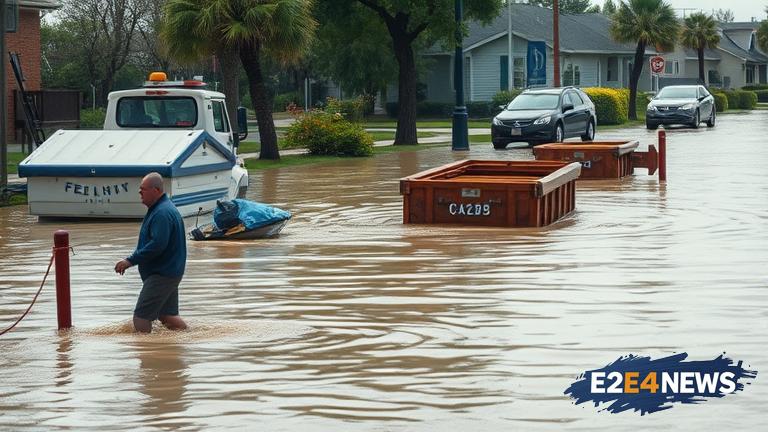The recent floods in Texas have brought to light the mismanagement and policy failures within the Federal Emergency Management Agency (FEMA). Employees of the agency have come forward to express their concerns and frustrations with the way the organization has handled the disaster relief efforts. According to these employees, FEMA’s response to the floods has been inadequate, with many criticizing the agency’s policies and procedures. The floods, which affected several counties including Ingram, Kerr County, and Kerrville, have left many residents without access to basic necessities like food, water, and shelter. The situation has been exacerbated by FEMA’s slow response, with many residents waiting for days or even weeks for assistance. The employees who spoke out against the agency’s mismanagement cited a lack of communication, inadequate resources, and poor planning as major contributors to the problems. They also expressed frustration with the agency’s bureaucracy, which they claim has hindered their ability to respond effectively to the disaster. The criticism of FEMA’s handling of the Texas floods is not new, as the agency has faced similar criticism in the past, particularly in the aftermath of Hurricane Katrina. The hurricane, which devastated the Gulf Coast in 2005, highlighted many of the same issues that are being seen in Texas today, including inadequate planning, poor communication, and a lack of resources. Despite the lessons that were supposed to have been learned from Katrina, it appears that many of the same mistakes are being repeated in Texas. The employees who spoke out against FEMA’s mismanagement are calling for changes to be made to the agency’s policies and procedures, including increased funding, improved communication, and a more streamlined response process. They are also advocating for greater accountability within the agency, including regular audits and performance reviews. The criticism of FEMA’s handling of the Texas floods has sparked a wider debate about the role of government in disaster relief and the need for more effective policies and procedures. Many are calling for a comprehensive review of the agency’s policies and procedures, as well as increased funding and resources to support disaster relief efforts. The situation in Texas is a stark reminder of the importance of effective disaster relief and the need for agencies like FEMA to be properly equipped and managed. As the situation continues to unfold, it is likely that there will be increased scrutiny of FEMA’s handling of the disaster and calls for greater accountability and reform. The agency’s response to the floods has been widely criticized, with many questioning the effectiveness of its policies and procedures. The employees who spoke out against the agency’s mismanagement are hoping that their voices will be heard and that changes will be made to prevent similar disasters in the future. The Texas floods have highlighted the need for a more effective and efficient disaster relief system, one that is able to respond quickly and effectively to the needs of those affected. It remains to be seen whether the criticism of FEMA’s handling of the disaster will lead to meaningful changes, but one thing is certain – the situation in Texas is a wake-up call for the need for more effective disaster relief policies and procedures. The floods have also raised questions about the impact of climate change on disaster relief efforts, with many experts warning that the frequency and severity of natural disasters are likely to increase in the coming years. As such, it is essential that agencies like FEMA are properly equipped and managed to respond to these disasters. The situation in Texas is a reminder that disaster relief is not just about responding to the immediate needs of those affected, but also about planning for the future and mitigating the risks associated with natural disasters. The criticism of FEMA’s handling of the Texas floods is likely to continue, with many calling for greater accountability and reform within the agency. The employees who spoke out against the agency’s mismanagement are hoping that their voices will be heard and that changes will be made to prevent similar disasters in the future. The Texas floods have highlighted the need for a more effective and efficient disaster relief system, one that is able to respond quickly and effectively to the needs of those affected. The situation is a stark reminder of the importance of effective disaster relief and the need for agencies like FEMA to be properly equipped and managed. The floods have also raised questions about the role of government in disaster relief and the need for more effective policies and procedures. Many are calling for a comprehensive review of the agency’s policies and procedures, as well as increased funding and resources to support disaster relief efforts. The situation in Texas is a wake-up call for the need for more effective disaster relief policies and procedures, and it remains to be seen whether the criticism of FEMA’s handling of the disaster will lead to meaningful changes.





